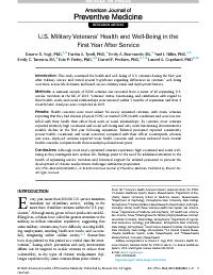U.S. Military Veterans’ Health and Well-Being in the First Year After Service
Introduction
This study examined the health and well-being of U.S. veterans during the first year after military service and tested several hypotheses regarding differences in veterans’ well-being over time, across life domains, and based on sex, military rank, and deployment history.
Methods
A national sample of 9,566 veterans was recruited from a roster of all separating U.S. service members in the fall of 2016. Veterans’ status, functioning, and satisfaction with regard to their health, work, and social relationships were assessed within 3 months of separation and then 6 months later. Analyses were completed in 2019.
Results
Health concerns were most salient for newly separated veterans, with many veterans reporting that they had chronic physical (53%) or mental (33%) health conditions and were less satisfied with their health than either their work or social relationships. By contrast, most veterans reported relatively high vocational and social well-being and only work functioning demonstrated a notable decline in the first year following separation. Enlisted personnel reported consistently poorer health, vocational, and social outcomes compared with their officer counterparts, whereas war zone–deployed veterans reported more health concerns and women endorsed more mental health concerns compared with their nondeployed and male peers.
Conclusions
Although most newly separated veterans experience high vocational and social well-being as they reintegrate into civilian life, findings point to the need for additional attention to the health of separating service members and bolstered support for enlisted personnel to prevent the development of chronic readjustment challenges within this population.
Geachte bezoeker,
De informatie die u nu opvraagt, kan door psychotraumanet niet aan u worden getoond. Dit kan verschillende redenen hebben,
waarvan (bescherming van het) auteursrecht de meeste voorkomende is. Wanneer het mogelijk is om u door te verwijzen naar de bron
van deze informatie, dan ziet u hier onder een link naar die plek.
Als er geen link staat, kunt u contact opnemen met de bibliotheek,
die u verder op weg kan helpen.
Met vriendelijke groet,
Het psychotraumanet-team.
Reference:
Dawne S. Vogt, PhD, Fanita A. Tyrell, PhD, Emily A. Bramande, BA, Yael I. Nillni, PhD, Emily C. Taverna, BA, Erin P. Finley, PhD, Daniel F. Perkins, PhD, Laurel A. Copeland, PhD | 2020
In: AJPM American Journal of Preventive Medicine ISSN: 0749-3797 | 58 | 3 | 352-360
https://www.ajpmonline.org/article/S0749-3797(19)30481-7/fulltext
In: AJPM American Journal of Preventive Medicine ISSN: 0749-3797 | 58 | 3 | 352-360
https://www.ajpmonline.org/article/S0749-3797(19)30481-7/fulltext
Keywords:
3MDR (Military Motion Memory Desensitization and Reprocessing) (en), Military Personnel, Quality of Life, Research, Statistical Analysis, Veterans


